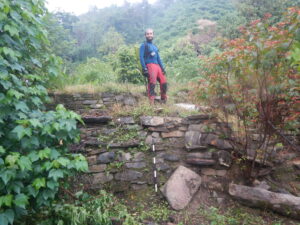Meet Our Wadsworth International Fellows: Daniel Rodriguez Osorio
 Daniel Rodriguez Osorio received his undergraduate degree at the Universidad de los Andes, Bogota, Colombia and thanks to the Wadsworth International Fellowship he will continue his training with a Ph.D. in archaeology at the University of Minnesota, Minneapolis-St. Paul.
Daniel Rodriguez Osorio received his undergraduate degree at the Universidad de los Andes, Bogota, Colombia and thanks to the Wadsworth International Fellowship he will continue his training with a Ph.D. in archaeology at the University of Minnesota, Minneapolis-St. Paul.
My research examines politics, ecology, and landscapes through an exploration of anthropogenic environments, place-making practices, and the constitution of subjectivities in Northern South America. Over the past eight years, I have conducted archaeological and ethnographic research in the Sierra Nevada de Santa Marta, a glaciated mountain located in northern Colombia that was inhabited in pre-Hispanic times by several indigenous communities known as the Tairona (200-1600 CE). My research explores the practices that shape human groups’ perceptions of “nature,” the political objectives that produce landscapes, and the ways that non-human actors and organisms (e.g., forests, cultivated plant species, soils) become objects of concern or value in human politics.
I draw on approaches that conceive of space as a political construct that people perceive in different ways depending on their social position. I also apply historical and political ecology to explore how diverse environmental contexts and non-human actors recursively shape distinct kinds of human experience. My interest in urbanism and intensive agriculture seeks to understand how discrete configurations of places and things constitute the structuration of specific landscapes and subjects and how physical conditions can also shape subjectivities and political life, leading to a variety of overlapping landscapes occupying the same space.
I am pursuing my Ph.D. to gain the theoretical and methodological training I need to understand the relationship between ecological and sociopolitical variables that contribute to the production of landscapes. Given the interdisciplinary structure of UMN, which allows graduate students to create their own program of study, I combine Anthropology, Geography, and Forest Resources. UMN faculty members specializing in ecology and cultural heritage also offer me an exceptional opportunity to consider issues of environmental, political, and archaeological stewardship and management in the SNSM. Moreover, UMN’s strong methodological focus on digital archaeology and environmental mapping provides me with the empirical tools I need to trace, document, and model land modification features in the Tairona area.
After completing my degree, I expect to return to Colombia and pursue an academic position that will allow me to train future generations of archaeologists and sociocultural anthropologists. I hope to use my interdisciplinary background to empower students to think about the materials and built spaces that constitute the present and past and the ways they mutually shape human experience.